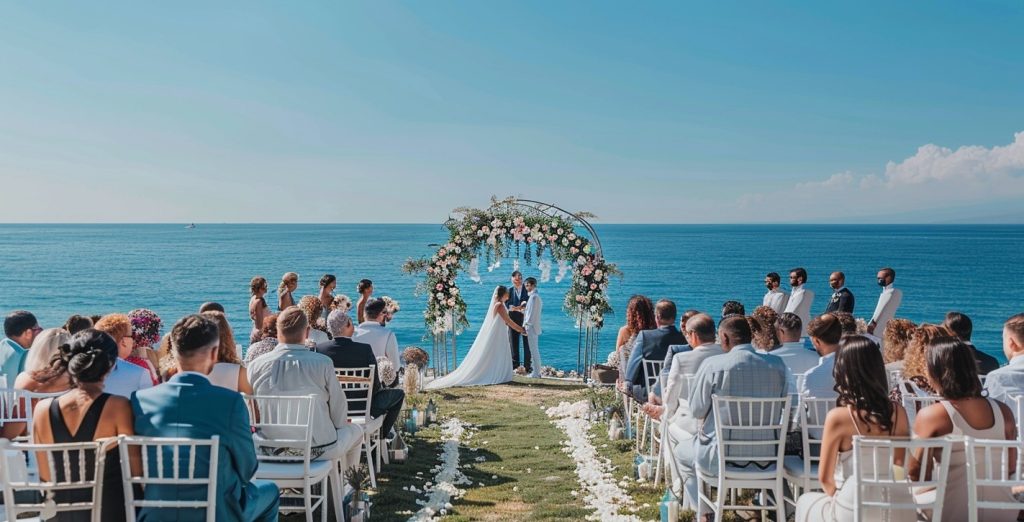Planning a wedding abroad can feel like a dream come true, with breathtaking backdrops and unique experiences just waiting for you.
But let’s be real—it comes with its own set of challenges that you should think about before saying “I do” in paradise. From figuring out the legal requirements and managing your budget to tackling language barriers and cultural differences, there’s a lot on your plate.
This guide dives into the essential elements of planning a destination wedding, so you can make informed decisions for your big day. Whether you’re picturing a tropical beach or a charming European village, you’ll find plenty of advice to help you along the way!
1. Cost and Budget Considerations
When you’re planning a destination wedding, it’s super important to wrap your head around cost and budget considerations since expenses can really vary depending on location, venues, and whether or not you hire a wedding planner to help create that unforgettable celebration you envision.
Several factors come into play that can seriously affect your overall expenses. For example, choosing the right venue often ends up being one of the biggest costs, especially since unique locations can charge premium rates. Then there’s catering, which can really add up. Your menu options can range from simple buffets to fancy plated dinners that reflect your tastes as a couple.
Don’t overlook transportation, either! Getting your guests to and from various locations can lead to some extra costs you didn’t plan for. Setting a budget early on can be a game changer, helping you navigate these expenses and make sure all the essential elements are accounted for.
Using a wedding checklist can also be a lifesaver. It helps you keep track of your spending and ensures that all those important details—like photography and decor—are included in your overall plan.
2. Legal Requirements and Paperwork
Navigating the legal requirements and paperwork for a destination marriage can feel pretty overwhelming since each location has its own set of rules about marriage licenses and the documentation you need to make sure your wedding day is officially recognized.
You’ll want to pay close attention to the specific necessities in popular spots because residency rules can really differ from one place to another. Some areas might require you to stick around for a certain amount of time before they issue a marriage license, while others could ask for a whole list of documents, like birth certificates and affidavits of single status.
To avoid any last-minute surprises, it’s super important to confirm these details with local authorities. Hiring a wedding coordinator who knows the local laws can be a game-changer, making the whole process smoother and ensuring that all the legal paperwork gets handled efficiently. This way, you can focus on what really matters—celebrating your love!
3. Language Barriers
Language barriers can really throw a wrench in your plans for a destination wedding. That’s why it’s super important to communicate effectively with local vendors and your wedding planner to make sure everything aligns with your vision.
To tackle these challenges, you might want to consider hiring bilingual wedding planners who speak both the local language and yours. This can make conversations a lot smoother and help with coordination.
Using translation apps can also be a total game changer for those on-the-go chats. When you’re dealing with local vendors, it’s crucial to set clear expectations about wedding decor, catering services, and guest accommodations.
Creating lists and confirming details in writing can help minimize misunderstandings, ensuring that every part of your celebration truly reflects your unique style and preferences.
4. Cultural Differences
Understanding cultural differences is super important when you’re planning a destination wedding. Local customs, traditions, and ceremonies can really enhance your wedding experience and create a unique vibe for your celebration.
By embracing these practices, you not only pay tribute to your chosen location but also invite your guests into a rich tapestry of experiences that reflect the local heritage. Whether it’s incorporating traditional music, unique floral arrangements, or age-old rituals, these elements can make the ceremony more memorable and engaging for everyone.
You can explore fun options like:
- A tea ceremony from East Asian cultures
- A lively hora dance from Jewish traditions
- Even a South Asian mehndi celebration
Every choice adds depth and meaning, turning your event into a cultural fusion that resonates with all your guests, fostering a sense of connection and appreciation for diverse traditions.
5. Weather and Climate
When you’re planning a destination wedding, it’s crucial to think about the weather and climate of your chosen spot. It can really impact your wedding timeline and the overall experience for you and your guests.
Each season has its own charm, but let’s be honest—there are also weather challenges that can throw a wrench in even the best plans. For example, spring might bring those gorgeous blossoms, but it can also surprise you with unexpected rain showers. Summer sounds dreamy with all that sunshine, but it can also come with sweltering heat.
It’s smart to look for venues that offer both indoor and outdoor options, just in case Mother Nature decides to play games. Creating backup plans—like renting tents or choosing places with flexible layouts—can help you breathe a little easier on the big day. By being prepared, you can focus on celebrating this special milestone without worrying about the weather ruining your vibe.
6. Limited Guest List
A limited guest list is often a hallmark of destination weddings, letting you create an intimate atmosphere that focuses on meaningful connections with your closest family and friends. Plus, it keeps guest accommodations and travel arrangements in check.
This thoughtful approach not only enhances the overall wedding experience by fostering deeper relationships among your guests but also helps you manage your budget more effectively. With fewer guests, you can significantly cut costs on catering, venue selection, and decor.
You can explore various strategies to make it easier for your guests to attend, like organizing group travel discounts, sharing info on local accommodations, or even looking into block reservations. By simplifying logistics, you’ll relieve some of the stress for your loved ones, making their journey to celebrate your special day both accessible and enjoyable.
7. Planning from a Distance
Planning a wedding from a distance might feel a bit overwhelming, but with a skilled wedding planner and a solid wedding itinerary, you can coordinate all aspects of your destination wedding from afar without losing your mind.
Thanks to technology and modern communication tools, you can manage every detail of your planning process without being on-site. Video calls are a game changer for virtual consultations with local vendors, letting you review options, ask important questions, and get a real feel for their services.
Plus, using collaborative platforms helps you keep track of tasks, guest lists, and budgets all in one place, making organization a breeze.
While remote planning is super efficient, it’s still a good idea to schedule site visits whenever possible. This hands-on approach ensures that your chosen locations live up to your expectations and gives you a chance to make adjustments based on your personal experience.
8. Finding Vendors and Suppliers
Finding reliable local vendors and suppliers is key to pulling off a successful destination wedding. They’re the ones who provide essential services like catering, wedding decor, and photography, making sure your dream wedding becomes a reality.
To research these vendors effectively, dive into online reviews and testimonials. They can give you valuable insights into the quality of service and client satisfaction you can expect. You might also want to schedule some interviews to see how well they understand your vision.
This is where a wedding planner can be a game-changer. They not only have solid relationships with reputable local vendors but also help coordinate everything seamlessly.
With their expertise, you can ensure that every little detail aligns with your cohesive vision, turning your ideas into a perfectly executed celebration that reflects your unique style.
9. Potential Travel Restrictions
Potential travel restrictions can really throw a wrench in your destination wedding plans, so it’s super important to stay in the loop about current regulations. You’ll want to make sure travel arrangements are flexible for both you and your guests.
This means regularly checking official travel advisories and updates from local authorities because you never know when regulations might change. Being proactive about understanding these conditions can help create a smoother experience amid all the uncertainties.
Having a solid contingency plan is essential; it lets you adapt to sudden changes without the added stress. Travel insurance becomes a lifesaver in this situation, protecting you from unforeseen circumstances like cancellations or medical emergencies.
By investing in comprehensive coverage, you and your guests can travel with peace of mind, knowing you’re financially protected if any unexpected issues pop up.
10. Dealing with Time Differences
Dealing with time differences when planning your destination wedding can definitely throw some curveballs your way, especially when you’re trying to coordinate with vendors and manage the timeline for guests coming from all over.
To keep everything running smoothly, it’s super important to set clear timelines and use scheduling tools that help you visualize the entire process. You might find it really helpful to use platforms that offer shared calendars; this way, everyone involved can stay on the same page, no matter what time zone they’re in.
Having a professional wedding coordinator can be a real lifesaver in this situation. They’re pros at handling the hiccups that come with time differences. With their expertise, they can communicate with vendors, streamline the logistics, and make sure all the wedding elements come together without a hitch, giving you that much-needed peace of mind.
Is a Destination Wedding Right for You?
Deciding if a destination wedding is the way to go for you involves thinking about a bunch of factors, like your wedding style, budget, and whether you picture yourself having a more intimate celebration surrounded by gorgeous scenery and rich cultural traditions.
When you weigh your personal preferences alongside these elements, you can really create an event that tells your unique love story. Intimate weddings often foster deeper connections, letting guests share those special moments in stunning settings—whether that’s a beach at sunset or a charming vineyard.
You can adapt various styles like rustic, bohemian, or elegant to fit the local culture and vibe, making the whole experience even more memorable. With the right planning, a destination wedding can create unforgettable memories, inviting your guests to not just witness your ceremony, but to embark on an adventure that goes way beyond the vows.
What Are the Most Popular Destinations for Weddings Abroad?
When you’re planning a destination wedding, picking a popular location can really elevate the whole experience. Iconic spots and well-known venues abroad give you stunning backdrops and a network of trusted vendors to make your big day that much easier.
Take the Amalfi Coast in Italy, for instance. It’s a hot favorite and for good reason—the cliffside views and luxurious villas create the perfect setting for an intimate celebration. Plus, you can dive into local customs, like a traditional Italian wedding feast, adding that authentic flair to your special day.
If you’re dreaming of a beach ceremony, the Caribbean is calling your name. Imagine the sound of gentle waves and vibrant sunsets, creating a relaxed vibe infused with island culture. And then there’s Bali, with its lush tropical landscapes. You could incorporate local traditions, like a Balinese blessing, to add a spiritual touch to the ceremony.
Each of these destinations doesn’t just offer picturesque settings; they bring unique cultural elements that can beautifully complement your wedding theme.
How Can You Make Your Destination Wedding Unique?
To make your destination wedding truly unique, think about incorporating personal touches, themed elements, and cultural ceremonies that reflect both your personalities and the local traditions of your chosen spot.
By weaving together meaningful symbols and stories that represent your journey as a couple, you turn every detail into a canvas for creativity. For example, choosing local flowers not only brings vibrant colors to your venue but also supports local artisans. And don’t forget about the food! Integrating traditional cuisine invites your guests to savor local flavors, maybe with a personalized menu featuring your favorite dishes or cherished family recipes.
Plus, incorporating local cultural practices—like dances or rituals—creates a rich celebration of heritage and unity. This way, your wedding becomes more than just an event; it transforms into a memorable narrative that truly captures your love story.
What Are the Benefits of Having a Destination Wedding?
A destination wedding offers you a ton of perks, like the chance for a more intimate ceremony, unique experiences for your guests, and the opportunity to celebrate in stunning locations that create unforgettable memories.
This kind of setting not only helps you trim down the guest list, making everything feel a bit more personal, but it also gives your guests the chance to explore a new place with you, strengthening those bonds along the way.
Plus, when you combine your wedding and honeymoon into one seamless adventure, you get to relax and enjoy the moment without the typical post-wedding burnout. It turns into an ongoing celebration rather than a sprint to the finish line.
Sharing these incredible moments with a handpicked group of friends and family adds so much emotional depth to the occasion, making it truly special in every way.
What Are the Potential Challenges of a Destination Wedding?
Destination weddings can be a blast, but they come with their share of challenges, like planning hiccups, coordinating travel arrangements, and hunting down local vendors who get your vision.
You might find yourself feeling a bit overwhelmed by all the details that come with planning a wedding from a distance, which can lead to some serious miscommunication and misunderstandings.
To tackle these issues, it’s super important for you to dive into some research about the location you’ve chosen. Connect with local experts who can share insights about regional customs and the legal requirements for tying the knot there.
Keeping the lines of communication open with everyone involved is key. This way, your desires and expectations are clear as day. And don’t underestimate the power of enlisting a savvy wedding coordinator; they can make your life a lot easier by streamlining the process, managing logistics, and tackling any problems that pop up.
This way, you get to enjoy the experience without all the stress.
How Can You Plan a Destination Wedding on a Budget?
Planning a destination wedding on a budget is totally doable if you keep an eye on your wedding budget and strategically choose wedding packages that give you great value without skimping on quality.
By picking off-peak times or less popular locations, you can really cut down on venue costs. Plus, those quieter spots can create a more relaxed atmosphere, making the whole experience better for everyone involved.
Bundled wedding packages are a lifesaver since they often include key services like catering and photography. This not only simplifies your planning but can also lead to some impressive savings.
Encouraging your guests to look for cost-effective travel options can help lighten the financial load for everyone. Think about group bookings for flights or accommodations—this not only keeps expenses low but also boosts the sense of camaraderie among your guests.
By prioritizing the essential elements of your celebration, you’ll keep the focus on creating unforgettable moments without breaking the bank.
Frequently Asked Questions
What is a destination wedding?
A destination wedding is a type of wedding where the couple and their guests travel to a chosen location, often a different country, to exchange vows and celebrate their marriage.
Why choose to have a wedding abroad?
There are many reasons why couples choose to have a wedding abroad. It could be because they want a unique and memorable experience, they have a special connection to a particular location, or they want to combine their wedding and honeymoon in one trip.
What are the popular destinations for a wedding abroad?
Some popular destinations for a wedding abroad include tropical beach locations such as the Caribbean, European cities like Paris or Rome, or exotic destinations like Bali or Thailand.
What are the benefits of having a wedding abroad?
Having a wedding abroad can offer a more intimate and personal experience, with only close family and friends in attendance. It also allows for a unique and stunning backdrop for the wedding photos, and can often be a more cost-effective option than a traditional wedding.
Do I need to hire a wedding planner for a wedding abroad?
Hiring a wedding planner for a wedding abroad can be very helpful, especially if you are not familiar with the location. They can assist with all the necessary arrangements and ensure that everything runs smoothly on the big day.
What documents do I need for a wedding abroad?
The required documents for a wedding abroad vary depending on the location, but typically you will need your passport, birth certificate, and any necessary visas. It is important to research the specific requirements for your chosen destination well in advance to avoid any issues.



